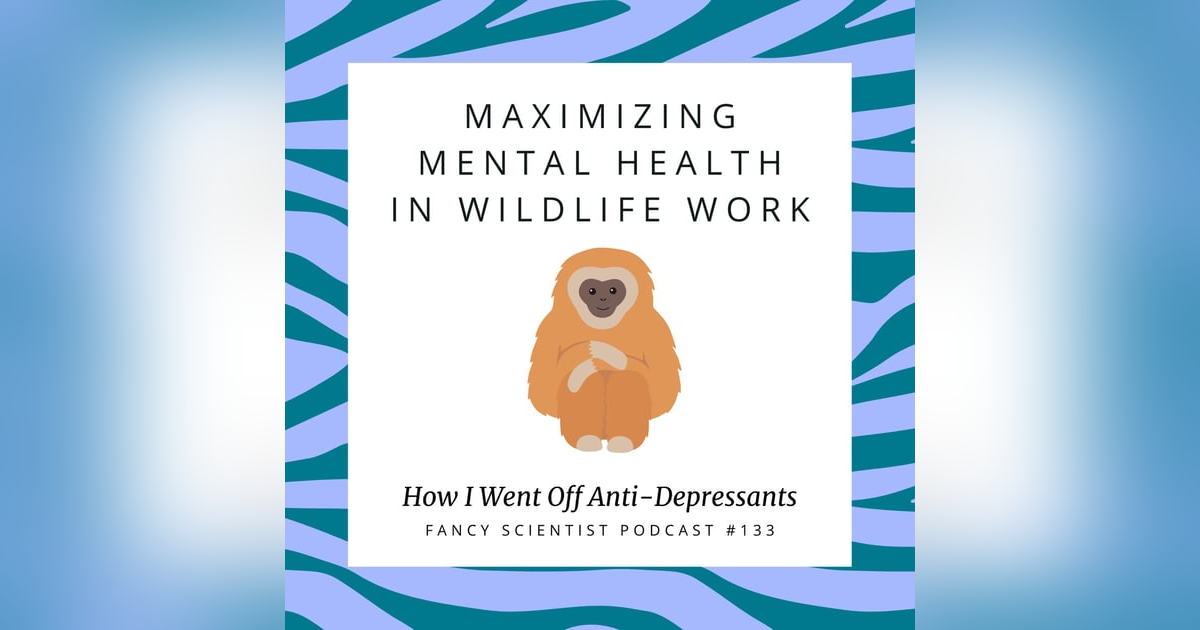Maximizing Mental Health in Wildlife Work: How I Went Off Anti-Depressants

If you’re involved in the wildlife or conservation field in any capacity, whether you are a current or aspiring career professional, someone volunteering their time to make the world better for wildlife, or simply just want to learn more to help out, chances are, you’ve struggled with the emotional toll that comes with trying to save a species, cope with the climate change crisis, get plastic out of our system, and the list goes on and on…
Unfortunately, the nature of the conservation field (no pun intended) is inherently dealing with loss. And without giving ourselves the care and attention that we need, in addition to the Earth, these emotions can evolve into chronic conditions.
Anxiety and depression are two such conditions that I have personally struggled with, have learned a lot about over the years, and now have largely overcome (although you’ll notice in this episode I’ve had a lot of ups and downs). Also, I know that I’m not alone.
Today I’m talking about my journey going on and now off of anti-depressants because I know many people in the wildlife field are struggling. I read Facebook posts from my friends who are struggling desperately in graduate school, and of course, I remember my own experiences while getting my PhD. Now, aspiring wildlife professionals are expected to work all the time, constantly put in their all, while their personal health and well-being take a backseat.
Even major scientific journals like Nature and Science have started to take notice and publish many articles about graduate students struggling with mental health disorders. In addition to the challenges associated with biodiversity loss, those working towards becoming wildlife professionals are suffering due to the increased demands put on them driven by intense competition.
This includes more papers to publish, more grant money to bring in, and the pressures of landing a job in this ultra-competitive field. It’s tough for people to deal with. Even for entry-level jobs, expectations are much higher than they were just a couple of decades ago.
In my decades of being in a wildlife and conservation field professional, I used anti-depressants really at the beginning of my career journey to help me cope. I thought there was something wrong with me that I just couldn’t be happy without them. Although they have been a valuable resource for me, in the past few years, I’ve learned so much about my mind and have developed tools, practices, and more that have allowed me to go off of them completely – something I was told by several doctors that I would not be able to do. For today’s podcast episode, I wanted to share this journey with you.
Here, I detail my long and ongoing journey of dealing with anxiety and depression, and what I did to support my mental health to the point of no longer needing antidepressants.I recognize the value of antidepressants, and if you’re currently on antidepressants, I’m not trying to convince you to go off them; rather, this is an episode about engaging in self-care. I provide you with the tools and mindset work that I’ve learned over the years. It’s been truly effective, and the reason behind how I was able to go completely off my antidepressants.
Specifically, I go over:
- How anxiety and depression are related to wildlife and conservation
- How the demands of working in a wildlife career have changed over the years
- Why focusing on mental health is essential and NEEDS to be a high priority for those in wildlife professions
- My personal journey going on and off of antidepressants: why and how I did it
- My favorite books for teaching you how to truly love yourself and restructure your self-talk
- How a healthy lifestyle and nature are essential tools that boost your mental health
- Other mindset tools for dealing with mental health struggles
- The importance of prioritizing your self care and that mental health is health
- And MORE!
Dream of being a wildlife biologist, zoologist, conservation biologist, or ecologist? Ready to turn your love of animals into a thriving career?🌿🐘 Then…
✍️ SIGN UP for my next FREE training: https://fancyscientist.com/3-pillars-to-success/
🗺️ Get my FREE wildlife career guide: https://fancyscientist.com/wildlife-career-success-guide/
📚 Read Getting a Job in Wildlife Biology: What It’s Like and What You Need to Know: https://www.amazon.com/Getting-Job-Wildlife-Biology-What/dp/B08JDYXS4G/
🚀 Work with me! Programs: https://stephanieschuttler.com/work-with-me/
I’m Dr. Stephanie Manka (formerly Schuttler), a wildlife biologist of 20 yrs who is on a mission to empower wildlife professionals and break stereotypes of scientists so they can get jobs, live out their life’s purpose and make a difference in this world.
🎥 How I became a wildlife biologist: https://youtu.be/zBvHRDO7gIg
Full show notes:
👉 https://stephanieschuttler.com/133-mental-health-wildlife/
Jump Links:
00:00 Introduction to Mental Health in Conservation
02:07 The Struggles of Mental Health in the Scientific Community
04:18 Personal Journey: Overcoming Antidepressants
10:43 The Importance of Self-Care and Mindset
20:27 Practical Tips for Mental Wellbeing
24:42 The Role of Nature and Exercise
26:35 Mindset Strategies and Emotional Management
37:19 Conclusion and Final Thoughts
Thank you to our sponsor Magic Mind!
60% off First Magic Mind Subscription and 20% off one-time purchase with code FANCYS20
Link to all 200 studies for Magic Mind ingredients
Let’s connect! 🤝✨
Website: https://fancyscientist.com/
Getting a Job in Wildlife Biology Facebook Group: https://www.facebook.com/groups/gettingajobinwildlifebiology
YouTube: https://www.youtube.com/@FancyScientist
Instagram: https://www.instagram.com/fancy_scientist/
LinkedIn: https://www.linkedin.com/in/sgschuttler/
Facebook: https://www.facebook.com/fancyscientist/
Twitter: https://twitter.com/FancyScientist
Threads: https://www.threads.net/@fancy_scientist
Bluesky: https://bsky.app/profile/fancyscientist.bsky.social
Pinterest: https://www.pinterest.com/fancyscientist/












